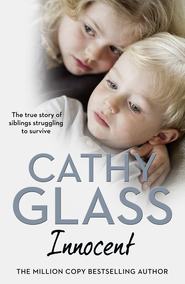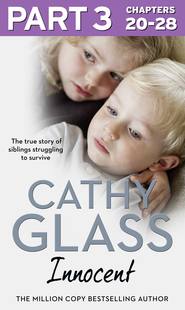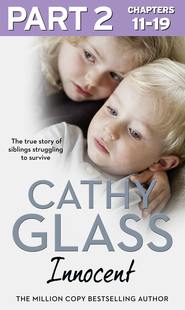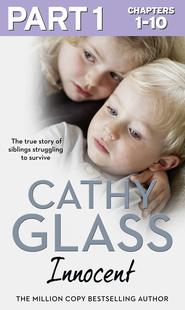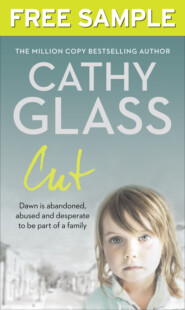По всем вопросам обращайтесь на: info@litportal.ru
(©) 2003-2024.
✖
The Saddest Girl in the World
Настройки чтения
Размер шрифта
Высота строк
Поля
‘Adrian, just wait there a moment,’ I called, and with Adrian paused in the front garden and Paula waiting for me to lift the pram over the step I picked up the phone. ‘Hello?’
‘Is that Cathy Glass?’ It was a woman's voice with a mellow Scottish accent.
‘Speaking.’
‘Hello, Cathy. It's Edna Smith, Donna's social worker. I spoke to Jill earlier. I think you're expecting my call?’
‘Oh yes, hello Edna. I'm sorry, can you just wait one moment please?’ I covered the mouthpiece. ‘It's a social worker,’ I said to Adrian. ‘Come back inside for a minute.’ He left his bike on the front path and came in, while I helped Paula reverse her pram a little along the hall so that I could close the front door. ‘I won't be long,’ I said to the children. ‘Go into the lounge and look at a book for a few minutes.’ Adrian tutted but nevertheless nodded to Paula to follow him down the hall and into the lounge.
‘Sorry, Edna,’ I said, uncovering the mouthpiece. ‘We were just going out.’
‘I'm sorry. Are you sure it's all right to continue?’
‘Yes, go ahead.’ In truth, I could hardly say no.
‘Cathy, I'm in the car now, with Donna. She's been a bit upset and I'm taking her for a drive. I had hoped to come and visit you, just for a few minutes?’
‘Well, yes, OK. How far away are you?’
‘About ten minutes. Would that be all right, Cathy?’
‘Yes. We were only going to the park. We can go later.’
‘Thank you. We won't stay long, but I do like to do an initial introductory visit before a move.’ So Donna was being moved, I thought, and while I admired Edna's dedication, for doubtless this unplanned visit had disrupted her schedule as it had ours, I just wished it could have waited for an hour until after our outing. ‘I should like to move Donna to you this evening, Cathy,’ Edna added, ‘if that's all right with you and your family?’
Clearly the situation with Donna and her brothers had deteriorated badly since she had spoken to Jill. ‘Yes, we'll see you shortly, then, Edna,’ I confirmed.
‘Thank you, Cathy.’ She paused. ‘And Cathy, you might find Donna is a bit upset, but normally she is a very pleasant child.’
‘OK, Edna. We'll look forward to meeting her.’
I replaced the receiver and paused for a minute in the hall. Edna had clearly been guarded in what she had said, as Donna was in the car with her and able to hear every word. But the fact that everything was happening so quickly said it all. Jill had phoned only an hour and a half before, and since then Edna had seen the need to remove Donna from the foster home to diffuse the situation. And the way Edna had described Donna — ‘a bit upset, but normally … a very pleasant child’ — was a euphemism I had no difficulty in interpreting. It was a case of batten down the hatches and prepare for a storm.
Adrian and Paula had heard me finish on the phone and were coming from the lounge and down the hall, ready for our outing. ‘Sorry,’ I said. ‘We'll have to go to the park a bit later. The social worker is bringing a girl to visit us in ten minutes. Sorry,’ I said again. ‘We'll go to the park just as soon as they've gone.’
Unsurprisingly they both pulled faces, Adrian more so. ‘Now I've got to get my bike in again,’ he grumbled.
‘I'll do it,’ I said. ‘Then how about I get you both an ice cream from the freezer, and you can have it in the garden while I talk to the social worker?’ Predictably this softened their disappointment. I pushed Paula's pram out of the way and into the front room, and then brought in Adrian's bike and put that in the front room too. I went through to the kitchen and took two Cornettos from the freezer, unwrapped them, and took a small bite from each before presenting them to the children in the lounge. They didn't comment — they were used to my habit of having a crafty bite. I opened the French windows and, while Adrian and Paula returned to the garden to eat their ice creams in the shade of the tree, I went quickly upstairs to check what, tonight, would be Donna's bedroom. Foster carers and their families get used to having their plans changed and being adaptable.
Chapter Two So Dreadfully Sad (#ulink_82220635-c710-5006-a512-de6b3f7de155)
No sooner had I returned downstairs than the front door bell rang. Resisting the temptation to peek through the security spy-hole for a stolen glance at my expected visitors, I opened the door. Edna and Donna stood side by side in the porch, and my gaze went from Edna, to Donna. Two things immediately struck me about Donna: firstly that, as Edna has said, she was a big girl, not overweight but just tall for her age and well built, and secondly that she looked so dreadfully, dreadfully sad. Her big brown eyes were downcast and her shoulders were slumped forward as though she carried the weight of the world on them. Without doubt she was the saddest-looking child I had ever seen — fostered or otherwise.
‘Come in,’ I said, welcomingly and, smiling, I held the door wide open.
‘Cathy, this is Donna,’ Edna said in her sing-song Scottish accent.
I smiled again at Donna, who didn't look up. ‘Hello, Donna,’ I said brightly. ‘It's nice to meet you.’ She shuffled into the hall and found it impossible to even look up and acknowledge me. ‘The lounge is straight ahead of you, down the hall,’ I said to her, closing the front door behind us.
Donna waited in the hall, head down and arms hanging loosely at her side, until I led the way. ‘This is nice, isn't it?’ Edna said to Donna, trying to create a positive atmosphere. Donna still didn't say anything but followed Edna and me into the lounge. ‘What a lovely room,’ Edna tried again. ‘And look at that beautiful garden. I can see swings at the bottom.’
The French windows were open and to most children it would have been an irresistible invitation to run off and play, happy for the chance to escape adult conversation, but Donna kept close to her social worker's side and didn't even look up.
‘Would you like to go outside?’ I asked Donna. ‘My children, Adrian and Paula, are out there having an ice cream. Would you like an ice cream?’ I looked at her: she was about five feet tall, only a few inches shorter than me, and her olive skin and dark brown hair suggested that one of her parents or grandparents was Afro-Caribbean. She had a lovely round face, but her expression was woeful and dejected; her face was blanked with sadness. I wanted to take her in my arms and give her a big hug.
‘Would you like an ice cream?’ Edna repeated. Donna hadn't answered me or even looked up to acknowledge my question.
She imperceptibly shook her head.
‘Would you like to join Adrian and Paula in the garden for a few minutes, while I talk to Cathy?’ Edna asked.
Donna gave the same slight shake of her head but said nothing. I knew that Edna would really have liked Donna to have gone into the garden so that she could discuss her situation candidly with me, which she clearly couldn't do if Donna was present. More details about Donna's family and what had brought her into care would follow with the placement forms Edna would bring with her when she moved Donna. But it would have been useful to have had some information now so that I could prepare better for Donna's arrival, anticipate some of the problems that might arise and generally better cater for her needs. Donna remained standing impassively beside Edna at the open French windows and didn't even raise her eyes to look out.
‘Well, shall we sit down and have a chat?’ I suggested. ‘Then perhaps Donna might feel more at home. It is good to meet you, Donna,’ I said again, and I lightly touched her arm. She moved away, as though recoiling from the touch. I thought this was one hurting child, and for the life of me I couldn't begin to imagine what ‘sibling rivalry’ had led to this; clearly there was more to it than the usual sibling strife.
‘Yes, that's a good idea. Let's sit down,’ Edna said encouragingly. I had taken an immediate liking to Edna. She was a homely middle-aged woman with short grey hair, and appeared to be one of the old-style ‘hands-on’ social workers who have no degree but years and years of practical experience. She sat on the sofa by the French windows, which had a good view of the garden, and Donna sat silently next to her.
‘Can I get you both a drink?’ I asked.
‘Not for me, thanks, Cathy. I took Donna out for some lunch earlier. Donna, would you like a drink?’ She turned sideways to look at her.
Donna gave that same small shake of the head without looking up.
‘Not even an ice lolly?’ I tried. ‘You can eat it in here with us if you prefer?’
The same half-shake of the head and she didn't move her gaze from where it had settled on the carpet, a couple of feet in front of her. She was perched on the edge of the sofa, her shoulders hunched forward and her arms folded into her waist as though she was protecting herself.
‘Perhaps later,’ Edna said.
I nodded, and sat on the sofa opposite. ‘It's a lovely day,’ I offered.
‘Isn't it just,’ Edna agreed. ‘Now, Cathy, I was explaining to Donna in the car that we are very lucky to have found you at such short notice. Donna has been rather unhappy where she has been staying. She came into care a month ago with her two younger brothers so that her mummy could have a chance to sort out a few things. Donna has an older sister, Chelsea, who is fourteen, and she is staying with mum at present until we find her a suitable foster placement.’ Edna met my eyes with a pointed look and I knew that she had left more unsaid than said. With Donna present she wouldn't be going into all the details, but it crossed my mind that Chelsea might have refused to move. I doubted Edna would have taken three children into care and left the fourth at home, but at fourteen it was virtually impossible to move a child without their full cooperation, even if it was in their best interest.
‘Donna goes to Belfont School,’ Edna continued, ‘which is about fifteen minutes from here.’
‘Yes, I know the school,’ I said. ‘I had another child there once, some years ago.’
‘Excellent.’ Edna glanced at Donna, hoping for some enthusiasm, but Donna didn't even look up. ‘Mrs Bristow is still the head there, and she has worked very closely with me. School doesn't start again until the fourth of September and Donna will be in year five when she returns.’ I did a quick calculation and realised that Donna was in a year below the one for her age. ‘Donna likes school and is very keen to learn,’ Edna continued positively. ‘I am sure that once she is settled with you she will catch up very quickly. The school has a very good special needs department and Mrs Bristow is flexible regarding which year children are placed in.’ From this I understood that Donna had learning difficulties and had probably (and sensibly) been placed out of the year for her age in order to better accommodate her learning needs. ‘She has a good friend, Emily, who is in the same class,’ Edna said, and she looked again at Donna in the hope of eliciting a positive response, but Donna remained hunched forward, arms folded and staring at the carpet.
‘I'll look forward to meeting Emily,’ I said brightly. ‘And perhaps she would like to come here for tea some time?’
Edna and I both looked at Donna, but she remained impassive. Edna touched her arm. ‘It's all right, Donna. You are doing very well.’
I looked at Donna and my heart went out to her: she appeared to be suffering so much, and in silence. I would have preferred her to have been angry, like so many of the children who had come to me. Shouting abuse and throwing things seemed a lot healthier than internalising all the pain, as Donna was. Huddled forward with her arms crossed, it was as though Donna was giving herself the hug of comfort she so badly needed. Again I felt the urge to go and sit beside her and hug her for all I was worth.
At that moment Adrian burst in through the open French windows, quickly followed by Paula. ‘I've brought in my wrapper,’ he said, offering the Cornetto wrapper; then he stopped as he saw Edna and Donna.
‘Good boy,’ I said. ‘Adrian, this is Donna, who will be coming to stay with us, and this is her social worker, Edna.’
Другие электронные книги автора Cathy Glass
Innocent




 0
0






